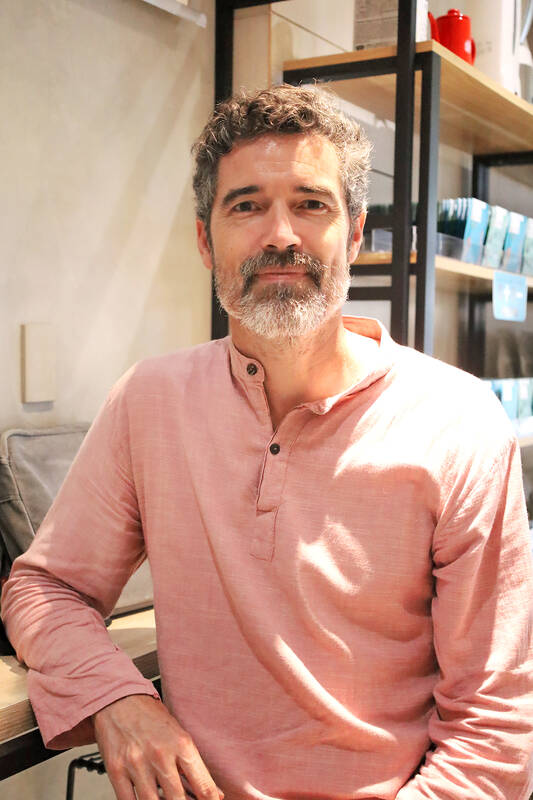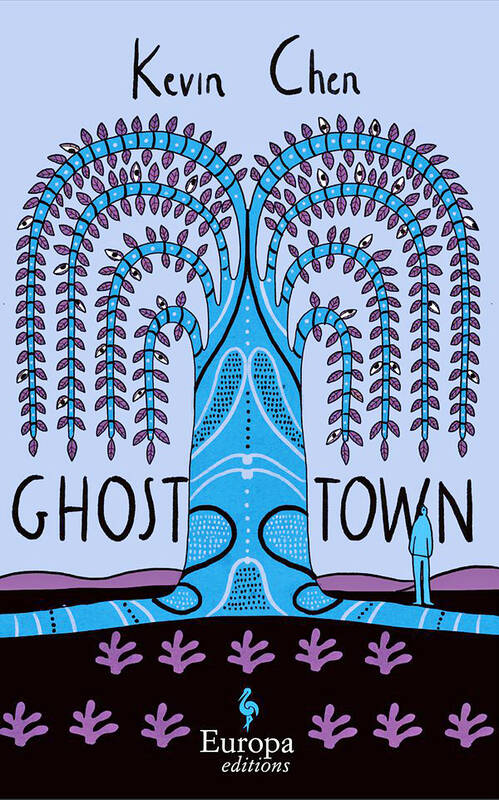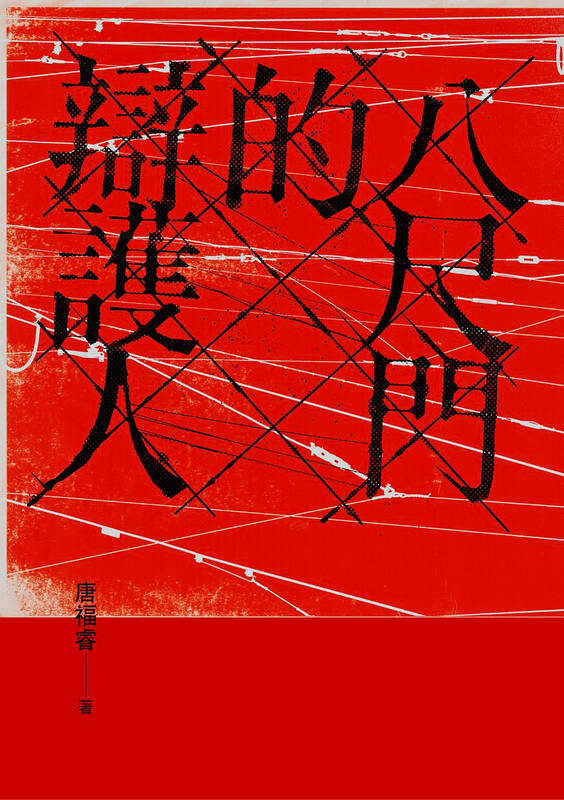Taiwan might be a land of scooters, but Joshua Dyer arrives via van to the cafe where we’ve we scheduled to meet.
“I have my surf board,” he says, “there are waves today.”
Dyer packs a lot into life. As well as a passion for surfing and music — he plays guitar, and previously had a job scouting folk musicians from Yunnan for US tours — Dyer works full time at Taipei-based literature agency Grayhawk.

Photo: Thomas Bird, Taipei Times.
“I’m employed by the agency but most of the work I do is for the Ministry of Culture,” he says of his role as the editor-in-chief of Books From Taiwan — a government-funded initiative that aims to promote Taiwanese authors to foreign publishers.
Dyer’s role is multi-faceted, managing translators, editing their work as well as promotional duties like attending the annual Taipei Book Fair. But he insists that what he’s doing is pretty simple.
“Basically, we want to make it easy for publishers to discover Taiwanese books by providing English language author bios, book descriptions and translated excerpts.”

Books From Taiwan also assists overseas publishers in applying for grants that will cover the costs of translation, he says.
Dyer admits Taiwan literature isn’t as popular globally as that of South Korea or Japan. But having spent the last five years immersed in the domestic scene, he believes the cultural and political landscape of contemporary Taiwan is nurturing a wave of fresh voices.
LITERARY TRENDS

As Dyer sees it, having accomplished self-rule after centuries of foreign regimes that controlled Taiwan, contemporary writers are now free to explore exactly what being Taiwanese means.
“The first literary reaction came with nativist movement,” he says of xiangtu (鄉土), or “hometown soil literature,” which emerged under the Japanese in the 1920s and resurfaced in the 1970s.
“This was very focused on descendants of Fujianese settlers and the experiences of the people who speak Taiwanese.”

Now, he says, there’s a broad recognition that “if you’re just going to focus on Taiwanese, you ignore a patchwork of overlapping cultural influences in Taiwan.”
This “patchwork” Dyer says, includes Western influence beginning with Dutch colonial rule, the long-subjugated indigenous cultures, the Hakka, the Hoklo and even the Mainlanders who came to Taiwan with the Chinese National Party (KMT) in 1949.
“They were also not in charge of their own destiny.”
Dyer believes there are now parallels with “the American melting pot” in contemporary Taiwan with people from disparate backgrounds “who’ve experienced authoritarianism and colonization” and are bound by values and a sense of “liberation.”
This has led to what he terms “hyper-localism,” a literary trend that goes beyond the old generalizations of ethnic or gender categorization to drill deep into the complexities of life.
As Dyer reads it, “Everybody’s got a range of influences in their lives” and “categories are just part of the framework from which we can build incredibly complex stories.”
HYPER-LOCALISM
When pushed to name some work that illustrates what he means by hyper-localism, Kevin Chen (陳思宏) springs to mind.
The former actor turned writer won the 2020 Golden Tripod Award and 2020 Taiwan Literature Award for novel Ghost Town (鬼地方).
An English version was published in 2022.
“It’s is about a gay Taiwanese man who lived in Germany for many years and returns to his hometown, a place he escaped long ago,” Dyer says.
Dyer describes a novel that employs multiple narrators, including dead “ghost narrators” to gradually construct a complex socioeconomic space that challenges the protagonist’s view of his hometown.
According to the Books From Taiwan Web site, Chen conjures a Macondo-like town in the tradition of Gabriel Garcia Marquez in which he “weaves a mesmerizing web of family secrets and countryside superstitions.”
“Chen is deconstructing Taiwanese identity, by making the individual the intersection of many different identities,” Dyer says.
Another book that is challenging convention, this time by tackling race and class issues, is Port of Lies (八尺門的辯護人) by Freddy Tang (唐福睿).
Tang is a lawyer-turned-filmmaker who originally wrote Port of Lies as a screenplay but couldn’t sell it, so he published it as a novel.Ironically, the book was so well received, it was adapted into a Netflix series.
Dyer says the story concerns a member of the Amis ethnicity who has escaped from a slum in Keelung, made it to Taipei and built a career as a lawyer, while in denial of his past.
“Then he ends up working on a case that involves Indonesian immigrants in Keelung.”
The story illuminates a “racial divide” of power, as a generation ago, the Han Taiwanese were the boat captains and the Amis where the laborers, while nowadays, the Amis are the boat captains while South East Asians do the labor.
“Power structures keep getting replicated with different ethnic groups, generation by generation,” Dyer says, a cycle of injustice that forces the lawyer to confront his past and identity.
SOFT POWER
It’s not just weighty literature in Taiwan that is making waves.
Dyer steers my attention to a piece of non-fiction by Jill Chang (張?仁) titled Quiet is a Superpower: The Secret Strengths of Introverts in the Workplace (安靜是種超能力).
“This was a big book in Japan. Chang is an introvert but she loves baseball and pursued her dream career in the US of becoming a baseball player agent.”
Dyer believes the success of the book shows that “Taiwan is really quite progressive in East Asia overall.”
He asserts the core message of the book is that people need to, “Lean into your strengths and don’t worry about the stuff you don’t do well.”
It’s a message that seems to describe what’s happening in Taiwanese literature more broadly.
For your information:
You can read about Taiwanese authors and download translated excerpts from books at: booksfromtaiwan.tw

Aug. 4 to Aug. 10 When Coca-Cola finally pushed its way into Taiwan’s market in 1968, it allegedly vowed to wipe out its major domestic rival Hey Song within five years. But Hey Song, which began as a manual operation in a family cow shed in 1925, had proven its resilience, surviving numerous setbacks — including the loss of autonomy and nearly all its assets due to the Japanese colonial government’s wartime economic policy. By the 1960s, Hey Song had risen to the top of Taiwan’s beverage industry. This success was driven not only by president Chang Wen-chi’s

Last week, on the heels of the recall election that turned out so badly for Taiwan, came the news that US President Donald Trump had blocked the transit of President William Lai (賴清德) through the US on his way to Latin America. A few days later the international media reported that in June a scheduled visit by Minister of National Defense Wellington Koo (顧立雄) for high level meetings was canceled by the US after China’s President Xi Jinping (習近平) asked Trump to curb US engagement with Taiwan during a June phone call. The cancellation of Lai’s transit was a gaudy

From Godzilla’s fiery atomic breath to post-apocalyptic anime and harrowing depictions of radiation sickness, the influence of the nuclear bombings of Hiroshima and Nagasaki runs deep in Japanese popular culture. In the 80 years since the World War II attacks, stories of destruction and mutation have been fused with fears around natural disasters and, more recently, the Fukushima crisis. Classic manga and anime series Astro Boy is called “Mighty Atom” in Japanese, while city-leveling explosions loom large in other titles such as Akira, Neon Genesis Evangelion and Attack on Titan. “Living through tremendous pain” and overcoming trauma is a recurrent theme in Japan’s

As last month dawned, the Democratic Progressive Party (DPP) was in a good position. The recall campaigns had strong momentum, polling showed many Chinese Nationalist Party (KMT) lawmakers at risk of recall and even the KMT was bracing for losing seats while facing a tsunami of voter fraud investigations. Polling pointed to some of the recalls being a lock for victory. Though in most districts the majority was against recalling their lawmaker, among voters “definitely” planning to vote, there were double-digit margins in favor of recall in at least five districts, with three districts near or above 20 percent in